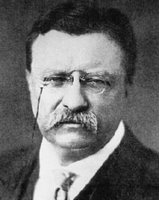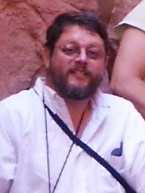
"The President is merely the most important among a large number of public servants. He should be supported or opposed exactly to the degree which is warranted by his good conduct or bad conduct, his efficiency or inefficiency in rendering loyal, able, and disinterested service to the Nation as a whole. Therefore it is absolutely necessary that there should be full liberty to tell the truth about his acts, and this means that it is exactly necessary to blame him when he does wrong as to praise him when he does right. Any other attitude in an American citizen is both base and servile. To announce that there must be no criticism of the President, or that we are to stand by the President, right or wrong, is not only unpatriotic and servile, but is morally treasonable to the American public. Nothing but the truth should be spoken about him or any one else. But it is even more important to tell the truth, pleasant or unpleasant, about him than about any one else."
Theodore Roosevelt in the Kansas City Star, 149, May 7, 1918
“While we hoped that popular revolt or coup would topple Saddam, neither the U.S. nor the countries of the region wished to see the breakup of the Iraqi state. We were concerned about the long-term balance of power at the head of the Gulf. Trying to eliminate Saddam, extending the ground war into an occupation of Iraq, would have violated our guideline about not changing objectives in midstream, engaging in "mission creep," and would have incurred incalculable human and political costs. Apprehending him was probably impossible. We had been unable to find Noriega in Panama, which we knew intimately. We would have been forced to occupy Baghdad and, in effect, rule Iraq. The coalition would instantly have collapsed, the Arabs deserting it in anger and other allies pulling out as well. Under those circumstances, furthermore, we had been self-consciously trying to set a pattern for handling aggression in the post-cold war world. Going in and occupying Iraq, thus unilaterally exceeding the U.N.'s mandate, would have destroyed the precedent of international response to aggression we hoped to establish. Had we gone the invasion route, the U.S. could conceivably still be an occupying power in a bitterly hostile land. It would have been a dramatically different--and perhaps barren--outcome.
Excerpt from "Why We Didn't Remove Saddam" by George Bush [Sr.] and Brent Scowcroft, Time (2 March 1998): or page 489 of Bush and Scowcroft's book, A World Transformed (Alfred A. Knopf, 1998).
Our nation is presently engaged in a debate about whether to launch a war against Iraq. It is beyond dispute that Saddam Hussein is a menace. He terrorizes and brutalizes his own people. That said, we need to think through this issue very carefully. We need to analyze the relationship between Iraq and our other pressing priorities--notably the war on terrorism... But there is scant evidence to tie Saddam to terrorist organizations, and even less to the Sept. 11 attacks. Indeed Saddam's goals have little in common with the terrorists who threaten us, and there is little incentive for him to make common cause with them. He is unlikely to risk his investment in weapons of mass destruction, much less his country, by handing such weapons to terrorists who would use them for their own purposes and leave Baghdad as the return address. Given Saddam's aggressive regional ambitions, as well as his ruthlessness and unpredictability, it may at some point be wise to remove him from power. Whether and when that point should come ought to depend on overall U.S. national security priorities. Our pre-eminent security priority--underscored repeatedly by the president--is the war on terrorism. An attack on Iraq at this time would seriously jeopardize, if not destroy, the global counterterrorist campaign we have undertaken. The United States could certainly defeat the Iraqi military and destroy Saddam's regime. But it would not be a cakewalk. On the contrary, it undoubtedly would be very expensive--with serious consequences for the U.S. and global economy--and could as well be bloody. Finally, if we are to achieve our strategic objectives in Iraq, a military campaign very likely would have to be followed by a large-scale, long-term military occupation. But the central point is that any campaign against Iraq, whatever the strategy, cost and risks, is certain to divert us for some indefinite period from our war on terrorism. Worse, there is a virtual consensus in the world against an attack on Iraq at this time. So long as that sentiment persists, it would require the U.S. to pursue a virtual go-it-alone strategy against Iraq, making any military operations correspondingly more difficult and expensive. The most serious cost, however, would be to the war on terrorism. Ignoring that clear sentiment would result in a serious degradation in international cooperation with us against terrorism. And make no mistake, we simply cannot win that war without enthusiastic international cooperation, especially on intelligence. ... the results could well destabilize Arab regimes in the region, ironically facilitating one of Saddam's strategic objectives. At a minimum, it would stifle any cooperation on terrorism, and could even swell the ranks of the terrorists. If we are truly serious about the war on terrorism, it must remain our top priority. In sum, if we will act in full awareness of the intimate interrelationship of the key issues in the region, keeping counterterrorism as our foremost priority, there is much potential for success across the entire range of our security interests--including Iraq. If we reject a comprehensive perspective, however, we put at risk our campaign against terrorism as well as stability and security in a vital region of the world.
From: “Don't Attack Saddam, It would undermine our antiterror efforts.” By BRENT SCOWCROFT Wall Street Journal, Thursday, August 15, 2002 12:01 a.m. EDT
(Mr. Scowcroft, national security adviser under President Gerald Ford and George H.W. Bush.)
Former President Jimmy Carter said Friday that there isn't "any doubt" the American people were misled about the war in Iraq and that President George Bush's policy on the war is a "radical departure from the policies of any president."
In an interview with CNN, Carter addressed some of the comments made in his new book, "Our Endangered Values: America's Moral Crisis." In the book he says the Bush administration was determined to attack Iraq using "false and distorted claims after 9/11."
Carter said the Bush administration spoke of mushroom clouds, weapons of mass destruction and the threat of thousands of Americans dying to garner support for the war. No weapons of mass destruction have been found in Iraq.
He was careful to say he didn't know whether intelligence was misinterpreted or purposely twisted, and Carter praised the attempts by his fellow Democrats in Congress to press efforts to look into the matter.
"If the investigation would go ahead and proceed, as Democrats have been trying to in the Senate now for more than 18 months, then we will know the circumstances under which the American people -- and I think an entire world -- was misled about what was going on in Iraq," he said.
Carter added that he had seen no evidence the White House was involved in the CIA leak investigation that ensnared Vice President Dick Cheney's chief of staff, I. Lewis "Scooter" Libby, last week.
Libby is accused of lying to investigators and a grand jury probing the disclosure of the identity of a CIA officer whose husband had challenged administration claims that then-Iraqi President Saddam Hussein had been trying to restart his nuclear weapons program.
Carter also said that the administration's pre-emptive strike doctrine directed against the possible future use of weapons of mass destruction is a spurious basis for a war when there is no immediate threat to America's security.
"We'll bomb, strafe and send missiles against their people even though our security's not directly threatened," he said. "This is contrary to international law. It's also contrary to what every president has done in this country for more than 100 years, Democrat or Republican."
As the former president spoke from the Carter Center in Atlanta, Georgia, protests in Mar del Plata, Argentina -- where Bush is attempting to promote free trade among the 34 nations comprising the Summit of the Americas -- had turned violent.
Shown live footage of the protests, Carter said the United States' reputation in the world is as low as it's been in his lifetime and that the United States has lost its prestige, authority and influence in Latin America. He added, however, that the chief opponent to the Free Trade Area of the Americas, Venezuelan President Hugo Chavez, is a "demagogue."
Before the protests turned violent, Chavez denounced capitalism to thousands of demonstrators from his perch in front of a six-story banner of communist revolutionary Che Guevara. Protesters, including Argentine soccer legend Diego Maradona, listened as Chavez claimed he would "bury" the Free Trade Area of the Americas proposal. Maradona wore a shirt accusing Bush of war crimes, while protesters called the U.S. president a "terrorist" and a "fascist."
Carter defended Bush and dismissed as rhetoric the words of the Venezuelan president.
"The personal attacks on the president and the condemnations of America by Hugo Chavez from Venezuela, I think, are completely unjustified and uncalled for," Carter said. "Chavez is a difficult person with whom to deal personally. I know from my own experience."
ATLANTA, Georgia (CNN)



No comments:
Post a Comment